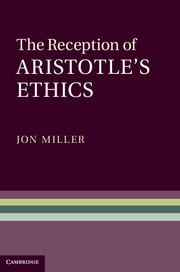Book contents
- The Reception of Aristotle's Ethics
- Contents
- Notes on contributors
- Acknowledgments
- A note on abbreviations and transliteration
- Introduction
- Chapter 1 The Nicomachean Ethics in Hellenistic philosophy
- Chapter 2 The transformation of Aristotle's ethics in Roman philosophy
- Chapter 3 Aristotelian ethics in Plotinus
- Chapter 4 St. Augustine's appropriation and transformation of Aristotelian eudaimonia
- Chapter 5 The Arabic and Islamic reception of the Nicomachean Ethics
- Chapter 6 Maimonides’ appropriation of Aristotle's ethics
- Chapter 7 The relation of prudence and synderesis to happiness in the medieval commentaries on Aristotle's ethics
- Chapter 8 Using Seneca to read Aristotle
- Chapter 9 Aristotle's Ethics in the Renaissance
- Chapter 10 The end of ends? Aristotelian themes in early modern ethics
- Chapter 11 Affective conflict and virtue
- Chapter 12 Kant and Aristotle on ethics
- Chapter 13 The fall and rise of Aristotelian ethics in Anglo-American moral philosophy
- Bibliography
- Index
Chapter 6 - Maimonides’ appropriation of Aristotle's ethics
Published online by Cambridge University Press: 05 February 2013
- The Reception of Aristotle's Ethics
- Contents
- Notes on contributors
- Acknowledgments
- A note on abbreviations and transliteration
- Introduction
- Chapter 1 The Nicomachean Ethics in Hellenistic philosophy
- Chapter 2 The transformation of Aristotle's ethics in Roman philosophy
- Chapter 3 Aristotelian ethics in Plotinus
- Chapter 4 St. Augustine's appropriation and transformation of Aristotelian eudaimonia
- Chapter 5 The Arabic and Islamic reception of the Nicomachean Ethics
- Chapter 6 Maimonides’ appropriation of Aristotle's ethics
- Chapter 7 The relation of prudence and synderesis to happiness in the medieval commentaries on Aristotle's ethics
- Chapter 8 Using Seneca to read Aristotle
- Chapter 9 Aristotle's Ethics in the Renaissance
- Chapter 10 The end of ends? Aristotelian themes in early modern ethics
- Chapter 11 Affective conflict and virtue
- Chapter 12 Kant and Aristotle on ethics
- Chapter 13 The fall and rise of Aristotelian ethics in Anglo-American moral philosophy
- Bibliography
- Index
Summary
The best place to begin is with what is uncontroversial. Except for the Politics, the entire Aristotelian corpus was available in Arabic in the ninth century and formed part of the intellectual heritage of Moses ben Maimon (1138–1204), known to English-speaking audiences as Maimonides. In a letter written in Arabic to Samuel ibn Tibbon, his Hebrew translator, Maimonides claims that with the exception of those gifted with prophetic inspiration, Aristotle's intellectual achievement represents the extreme of the human intellect. This sentiment is repeated in the Guide of the Perplexed (henceforth: Guide), when he refers to Aristotle, albeit obliquely, as “chief of the philosophers” (1.5.29).
But when it comes to the Nicomachean Ethics in particular, Maimonides’ familiarity with Aristotle is open to question. It is now generally agreed that the inspiration for “Eight Chapters,” a section taken from his Commentary on the Mishnah and often published as a free-standing essay, is not Aristotle but Alfarabi's Aphorisms of the Statesman. Although there are several references to the N.E. in the Guide, two are incorrect and three deal with Aristotle on the sense of touch.
- Type
- Chapter
- Information
- The Reception of Aristotle's Ethics , pp. 107 - 124Publisher: Cambridge University PressPrint publication year: 2012
- 1
- Cited by

